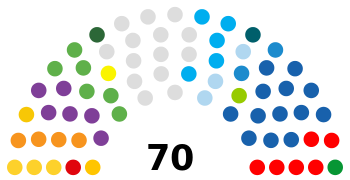| |||||||||||||||||||||||||||||||||||||||||||||||||||||||||||||||||||||||||||||||||||||||||||||||||||||||||||||||||||||||||||||||||||||||||||||||||||||||||
All 70 seats to the Legislative Council 36 seats needed for a majority | |||||||||||||||||||||||||||||||||||||||||||||||||||||||||||||||||||||||||||||||||||||||||||||||||||||||||||||||||||||||||||||||||||||||||||||||||||||||||
|---|---|---|---|---|---|---|---|---|---|---|---|---|---|---|---|---|---|---|---|---|---|---|---|---|---|---|---|---|---|---|---|---|---|---|---|---|---|---|---|---|---|---|---|---|---|---|---|---|---|---|---|---|---|---|---|---|---|---|---|---|---|---|---|---|---|---|---|---|---|---|---|---|---|---|---|---|---|---|---|---|---|---|---|---|---|---|---|---|---|---|---|---|---|---|---|---|---|---|---|---|---|---|---|---|---|---|---|---|---|---|---|---|---|---|---|---|---|---|---|---|---|---|---|---|---|---|---|---|---|---|---|---|---|---|---|---|---|---|---|---|---|---|---|---|---|---|---|---|---|---|---|---|---|
| Opinion polls | |||||||||||||||||||||||||||||||||||||||||||||||||||||||||||||||||||||||||||||||||||||||||||||||||||||||||||||||||||||||||||||||||||||||||||||||||||||||||
| Registered | 3,466,201 (GC) | ||||||||||||||||||||||||||||||||||||||||||||||||||||||||||||||||||||||||||||||||||||||||||||||||||||||||||||||||||||||||||||||||||||||||||||||||||||||||
| Turnout | 1,838,722 (53.05%) | ||||||||||||||||||||||||||||||||||||||||||||||||||||||||||||||||||||||||||||||||||||||||||||||||||||||||||||||||||||||||||||||||||||||||||||||||||||||||
| |||||||||||||||||||||||||||||||||||||||||||||||||||||||||||||||||||||||||||||||||||||||||||||||||||||||||||||||||||||||||||||||||||||||||||||||||||||||||
| |||||||||||||||||||||||||||||||||||||||||||||||||||||||||||||||||||||||||||||||||||||||||||||||||||||||||||||||||||||||||||||||||||||||||||||||||||||||||
The 2012 Hong Kong Legislative Council election was held on 9 September 2012 for the 5th Legislative Council (LegCo) since the establishment of the Hong Kong Special Administrative Region.
Contents
- Eligibility
- Right to vote
- Right to stand
- New structure of the Legislative Council
- Geographical constituencies
- Functional constituencies
- Retiring incumbents
- Pre-election issues
- New leadership under Leung Chun-ying
- Moral and National Education controversy
- Opinion polling
- Results
- Election results overall
- Election results by Geographical Constituency
- Votes gained by each party by districts
- Votes summary
- Seats summary
- Incumbents defeated
- Candidates lists and results
- Geographical Constituencies (35 seats)
- District Council (Second) Functional Constituency (5 seats)
- Other Functional Constituencies (30 seats)
- See also
- References
- External links
The election was for the new total of 70 seats in LegCo, ten more than previously, with 35 members elected in geographical constituencies through direct elections, and 35 members in functional constituencies. [1] Under new arrangements agreed in a contentious LegCo vote in 2010, five District Council (Second) functional constituency seats each represent all 18 District Councils of Hong Kong voted for by all resident voters in Hong Kong (who did not have a vote in any other functional constituency), effectively increasing the number of seats elected with universal suffrage to 40. [2]
The pro-Beijing camp scored a major success, maintaining its dominance in the functional constituencies and winning 17 of the 35, nearly half, of the geographical constituency seats, which were considered to be the stronghold of the pan-democracy camp. The Democratic Alliance for the Betterment and Progress of Hong Kong (DAB), the flagship Beijing-loyalist party, won 13 seats in total, more than double the tally of either the pro-democracy Democratic Party or Civic Party, or of its sister organisation, the Hong Kong Federation of Trade Unions (FTU), which each won six seats.
The Democratic Party, the flagship pro-democracy party, suffered the worst defeat since its creation in 1994, winning only six seats and lost all its seats in the New Territories West, while the radical democrats League of Social Democrats and the newly formed People Power doubled their total votes. Despite the addition of five new geographical constituency seats, the pan-democrats won one seat fewer than in the 2008 election; infighting within the camp was blamed. [3] The Civic Party failed in their election strategy as two of their incumbents, Audrey Eu and Tanya Chan, placed second on the lists in Hong Kong Island and New Territories West both received over 70,000 votes, far more than other lists, but still unable to get re-elected. [4]
The pro-business Liberal Party's chairwoman Miriam Lau failed to gain a seat in Hong Kong Island, winning the least seats in party history although James Tien regained his seat in New Territories East. Both Miriam Lau from the Liberals and Albert Ho from the Democrats resigned their seats as chairs after the defeat.
The pan-democracy and pro-Beijing camps both placed three lists in contest of the five new District Council (Second) functional constituency seats. Three of them went to the Democrats, Albert Ho and James To and Frederick Fung from the Association for Democracy and People's Livelihood (ADPL). The Beijing-loyalists could only win two seats with FTU's Chan Yuen-han and DAB's Starry Lee each getting one seat. Veteran Lau Kong-wah became the only DAB candidate who was placed first on a candidate list but lost in the election.




















